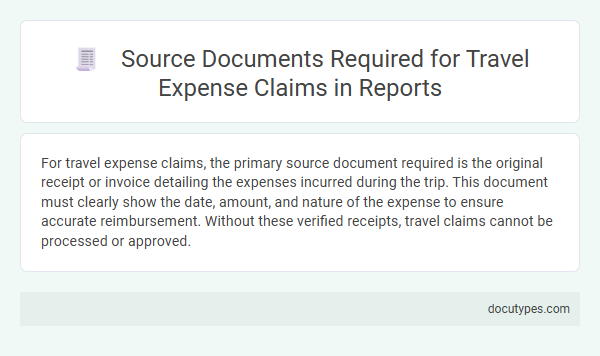For travel expense claims, the primary source document required is the original receipt or invoice detailing the expenses incurred during the trip. This document must clearly show the date, amount, and nature of the expense to ensure accurate reimbursement. Without these verified receipts, travel claims cannot be processed or approved.
Introduction to Travel Expense Claim Documents
Travel expense claims require specific source documents to ensure accurate reimbursement and compliance with company policies. Proper documentation supports the legitimacy of expenses incurred during business travel.
Source documents typically include receipts, invoices, and boarding passes that verify transportation, lodging, and meal costs. Your employer may request additional proof, such as mileage logs for personal vehicle use. Maintaining organized and complete documents helps streamline the expense approval process and prevents delays.
Importance of Source Documents in Claims
Source documents are essential for validating travel expense claims and ensuring accurate reimbursement. These documents provide proof of expenditure, helping to maintain transparency and compliance with company policies.
- Receipts - Official proof of payment, detailing the date, amount, and vendor of each transaction.
- Itineraries - Documentation outlining travel dates and destinations to support claimed expenses.
- Credit Card Statements - Records that verify payment methods and amounts charged during travel.
Categories of Acceptable Source Documents
Source documents for travel expense claims must clearly verify the expenses incurred. Acceptable categories include receipts, invoices, and credit card statements that detail the date, amount, and nature of the expense. Other valid documents include travel itineraries, boarding passes, and accommodation confirmations that support the claimed travel costs.
Receipts for Transportation Expenses
Receipts for transportation expenses are essential source documents for travel expense claims. These receipts must clearly show the date, amount, and type of transportation used, such as taxi, bus, or train tickets. You should retain all original receipts to ensure proper reimbursement and accurate record-keeping.
Accommodation Invoice Requirements
Accommodation invoices are essential source documents for travel expense claims, validating the costs incurred during your trip. Accurate and complete invoices ensure compliance with company policies and facilitate reimbursement processes.
The accommodation invoice must clearly display the provider's name, address, and contact details. It should include the guest's name, dates of stay, and a detailed breakdown of charges, including taxes and fees. The invoice must be an original or an official electronic version with all required information visible for verification purposes.
- Provider Details - The invoice must show the accommodation provider's complete contact information for authenticity verification.
- Guest and Stay Information - It should specify your name, check-in and check-out dates, confirming the period claimed.
- Detailed Charges - The document must include an itemized list of costs, including room rates, taxes, and any additional fees incurred.
Meal and Entertainment Receipt Criteria
Travel expense claims require valid source documents to ensure compliance and accurate reimbursement. Meal and entertainment receipts must meet specific criteria to qualify as acceptable proof of expenses.
- Itemized Receipt - The receipt must show a detailed breakdown of foods and beverages purchased, excluding credit card slips.
- Date and Location - The receipt must clearly display the date and the place where the meal or entertainment was provided.
- Business Purpose - Documentation or notation explaining the business context and attendees related to the meal or entertainment is mandatory.
Only receipts fulfilling these criteria should be submitted for meal and entertainment travel expense claims to ensure proper validation.
Mileage Log Documentation
Travel expense claims require precise documentation to validate the expenses incurred. A mileage log is a crucial source document for claiming vehicle travel costs.
The mileage log must detail the date, starting point, destination, purpose of the trip, and miles traveled. Accurate and comprehensive mileage logs ensure compliance with company policies and tax regulations.
Currency Conversion Proofs
Travel expense claims require specific source documents to verify the accuracy of submitted costs. Currency conversion proofs are essential when expenses are incurred in foreign currencies to validate the exchange rates used.
These proofs include official bank statements, currency exchange receipts, or statements from recognized financial institutions. Your claim must include these documents to ensure compliance with company policies and auditing standards.
Digital vs. Physical Document Submission Guidelines
| Aspect | Digital Document Submission | Physical Document Submission |
|---|---|---|
| Required Source Documents | Digital receipts, scanned invoices, e-tickets, digital boarding passes, and PDF expense reports are accepted. | Original paper receipts, printed invoices, physical boarding passes, and handwritten expense forms are required. |
| Submission Guidelines | Upload scanned copies or digital files to the company's expense management system. Files must be clear, legible, and in accepted formats such as PDF, JPEG, or PNG. | Submit original documents to the finance department or designated collection point. Documents must be organized, stapled, or clipped according to submission instructions. |
| Verification Process | Automatic verification tools cross-check digital timestamps, content authenticity, and file integrity. Manual review ensures compliance with expense policies. | Manual verification by finance personnel confirms authenticity and matches documents with submitted expense claims. |
| Storage and Record Keeping | Documents are stored securely in encrypted digital archives, enabling easy retrieval and backup procedures. | Physical documents are filed in secure storage rooms or cabinets with restricted access. |
| Advantages | Faster processing times, reduced paper use, remote submission capability, and improved audit trails through metadata. | Provides tangible proof, useful in cases where digital submission is not feasible or when original signatures are mandated. |
| Challenges | Dependent on digital infrastructure, potential file corruption, risk of incomplete submissions if scanning is poor. | Risk of document loss or damage, longer processing times, and physical storage space requirements. |
What Source Document Is Required for Travel Expense Claims? Infographic

